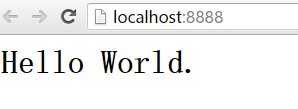基于HttpListener的web服务器
写在前面
前面两篇文章分别介绍了基于原始socket的web服务器和基于tcpListener的web服务器,本篇文章将继续介绍另外一种基于HttpListener的。
HttpListener
HttpListener进一步的简化了Http协议的监听,仅需通过字符串的方法提供监听的地址和端口号以及虚拟路径,就可以开始监听工作了。
using System; using System.Collections.Generic; using System.Linq; using System.Net; using System.Text; using System.Threading.Tasks; namespace HttpListenerWebServer { class Program { static void Main(string[] args) { //httpListener提供一个简单,可通过编程方式控制的Http协议侦听器。此类不能被继承。 if (!HttpListener.IsSupported) { //该类只能在Windows xp sp2或者Windows server 200 以上的操作系统中才能使用,因为这个类必须使用Http.sys系统组件才能完成工作 //。所以在使用前应该先判断一下是否支持该类 Console.WriteLine("Windows xp sp2 or server 2003 is required to use the HttpListener class"); } //设置前缀,必须以‘/’结尾 string[] prefixes = new string[] { "http://localhost:8888/" }; //初始化监听器 HttpListener listener = new HttpListener(); //将前缀添加到监听器 foreach (var item in prefixes) { listener.Prefixes.Add(item); } //判断是否已经启动了监听器,如果没有则开启 if (!listener.IsListening) { listener.Start(); } //提示 Console.WriteLine("服务器已经启动,开始监听...."); while (true) { //等待传入的请求,该方法将阻塞进程,直到收到请求 HttpListenerContext context = listener.GetContext(); //取得请求的对象 HttpListenerRequest request = context.Request; //打印状态行 请求方法,url,协议版本 Console.WriteLine("{0} {1} HTTP/{2}\r\n", request.HttpMethod, request.RawUrl, request.ProtocolVersion); //打印接收类型 Console.WriteLine("Accept: {0}", string.Join(",", request.AcceptTypes)); //打印接收语言 Console.WriteLine("Accept-Language: {0}", string.Join(",", request.UserLanguages)); //打印编码格式 Console.WriteLine("Accept-Encoding: {0}", string.Join(",", request.Headers["Accept-Encoding"])); //客户端引擎 Console.WriteLine("User-Agent: {0}", string.Join(",", request.UserAgent)); //是否长连接 Console.WriteLine("Connection: {0}", request.KeepAlive ? "Keep-Alive" : "close"); //客户端主机 Console.WriteLine("Host: {0}", request.UserHostName); Console.WriteLine("Pragma: {0}", request.Headers["Pragma"]); //取得响应对象 HttpListenerResponse response = context.Response; //构造响应内容 //准备发送到客户端的网页 string responseBody = "<html><head><title>这是一个web服务器的测试</title></head><body><h1>Hello World.</h1></body></html>"; //设置响应头部内容,长度及编码 response.ContentLength64 = System.Text.Encoding.UTF8.GetByteCount(responseBody); response.ContentType = "text/html; Charset=UTF-8"; //输出响应内容 System.IO.Stream output = response.OutputStream; System.IO.StreamWriter sw = new System.IO.StreamWriter(output); sw.Write(responseBody); sw.Dispose(); break; } //关闭服务器 listener.Close(); Console.Read(); } } }
启动服务器,并在浏览器中输入:http://localhost:8888/ 回车


总结
在使用httplistener时,我们可以通过对象的属性获取到请求和响应的参数。
-
博客地址:http://www.cnblogs.com/wolf-sun/
博客版权:如果文中有不妥或者错误的地方还望高手的你指出,以免误人子弟。如果觉得本文对你有所帮助不如【推荐】一下!如果你有更好的建议,不如留言一起讨论,共同进步! 再次感谢您耐心的读完本篇文章。


 浙公网安备 33010602011771号
浙公网安备 33010602011771号